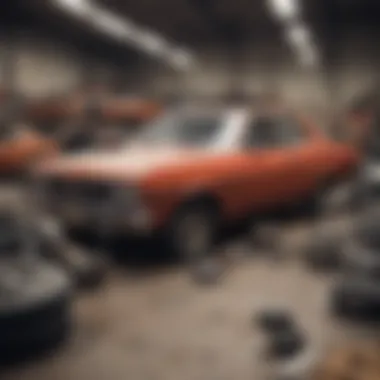Understanding Junk Yards: Selling Your Junk Car


Intro
The topic of junk yards and their operations in buying junk cars is often overlooked yet is crucial for many vehicle owners. Understanding the dynamics of these operations can empower sellers. This section aims to clarify what junk yards do, the motivations behind selling a junk car, and the factors influencing the overall process.
Junk yards primarily serve as the middlemen in the lifecycle of a vehicle. They purchase cars that are no longer operational, or have reached the end of their useful life. This not only benefits sellers but also plays a role in recycling and environmental conservation. By focusing on dismantling and recycling, junk yards help reduce waste and promote the reuse of automotive parts.
When a vehicle reaches a point where repair is not economically viable, the decision to sell it to a junk yard becomes a practical one. The owner can recover some value, despite the car's condition. This process involves careful consideration of various factors, such as the car's make, model, and the demand for its parts.
In this article, we will delve into the complex operations of junk yards. We will examine key considerations for sellers, valuation processes, and how insurance can impact decisions to sell. Moreover, the environmental implications will be discussed, highlighting the significance of responsible disposal practices.
Understanding these dynamics allows both consumers and industry professionals to navigate the realm of junk cars more effectively. Let’s explore the details further.
Understanding Junk Yards
Understanding the role of junk yards is crucial for anyone considering selling a junk car. Junk yards play a significant role in the automotive lifecycle, where vehicles at the end of their functional life can still provide value. They serve multiple purposes including recycling parts and materials, which benefits the environment. When individuals sell their junk cars to these facilities, they contribute to a circular economy that helps in resource recovery and waste management.
Junk yards can also provide cash assistance to sellers. This financial incentive can ease the burden of owning a car that no longer functions adequately. Furthermore, understanding how junk yards operate can help sellers navigate the selling process effectively, ensuring they get fair value for their vehicles.
Definition and Function
A junk yard, also known as a scrapyard or wrecking yard, is a place where end-of-life vehicles are placed. These vehicles are often dismantled for parts or recycled for their materials. The primary function of a junk yard is to act as an intermediary in the lifecycle of a vehicle. It plays a vital role by either salvaging components that are still usable or processing the waste materials in an environmentally friendly way.
Types of Junk Yards
There are various types of junk yards that specialize in different processes regarding junk cars. Each type plays a specific role in the recycling and salvage process. The three main types include auto dismantlers, scrap yards, and salvage yards.
Auto Dismantlers
Auto dismantlers focus on breaking down vehicles into their constituent parts. This process allows for the reuse of usable parts in other vehicles or to sell them individually. One key characteristic of auto dismantlers is their ability to maximize the recovery of valuable components, such as engines, transmissions, and electronics. This makes them a beneficial choice for those looking to repurpose parts rather than simply crush the whole vehicle. However, the dismantling process requires skilled labor, which can result in higher operational costs.
Scrap Yards
Scrap yards concentrate primarily on processing metal from junk cars and other materials. Their key characteristic is the large-scale crushing and shredding of vehicles, which allows them to recycle valuable metals like steel and aluminum. This is a popular choice for sellers looking to quickly dispose of their vehicles without needing specific parts removed. However, scrap yards typically offer lower financial returns compared to auto dismantlers since they focus more on material quantity than individual components.
Salvage Yards
Salvage yards are unique because they find a balance between parts recovery and metal recycling. These facilities often keep vehicles intact longer to sell them as complete units or break them down for parts later. The advantage of salvage yards is that they can appeal to those seeking either functional parts to fix their cars or people looking to dispose of a non-working vehicle efficiently. However, sellers may face delays if parts are not immediately available, as owners may want to keep vehicles longer in hopes of finding buyers for specific components.
Industry Regulations and Standards
The junk yard industry is subject to various regulations that govern the handling of automotive waste, including hazardous materials. These regulations help ensure the safety of the environment and nearby communities. Standards also dictate how junk cars are processed to prevent pollution and ensure that any hazardous materials, such as fluids and batteries, are dealt with appropriately. Compliance with these regulations is essential for junk yards to operate legally and responsibly.
Understanding these elements about junk yards prepares sellers for successful transactions. Awareness of the types and roles of junk yards helps owners make informed decisions when it comes to their vehicles.
The Process of Selling a Junk Car
Selling a junk car requires understanding a few key elements. This process is important as it not only ensures a smooth transaction but also maximizes the potential gains from the sale. Knowing what to expect and how to prepare is crucial for efficient dealings with junk yards.
Initial Assessment
The initial assessment is the first step in the process of selling your junk car. Assessing its condition helps in setting realistic expectations. Here, sellers need to take stock of the car's overall status, checking its operational elements, structural integrity, and appearance.
This step is not just beneficial but also necessary. It allows for informed discussions with junk yard representatives. Often, a well-documented condition report can make negotiations easier.
Additionally, factors like mileage and any past repairs can influence discussions on value. Being honest about the vehicle's status can build trust and potentially lead to better offers.
Documentation Required
When selling a junk car, proper documentation is essential. This includes handling two main aspects: the title transfer and lien information.


Title Transfer
Title transfer is the legal process of moving ownership from the seller to the junk yard. It contributes to clarifying ownership, which protects both parties in the transaction. The key characteristic of a title transfer is that it records the sale officially, preventing disputes later on.
This process is beneficial as it formalizes the sale. One unique feature is that it prevents any potential liabilities associated with the car after the sale. Just make sure there are no outstanding fees or violations against the vehicle.
However, if the title is lost, it can complicate the selling process. Sellers might need to navigate state-specific regulations to obtain a duplicate.
Lien Information
Lien information is another aspect that deserves attention. This refers to any financial claims against the car from lenders or creditors. Its contribution to the selling process is significant, as having an outstanding lien can hinder the sale.
The key characteristic here is transparency. Being upfront about any liens is crucial as it affects the junk yard's willingness to purchase. If there's no lien, it makes the transaction smoother and less risky.
On the downside, if there are unresolved liens, sellers may need to address this before seeing any financial return.
Valuation of a Junk Car
Understanding how your junk car is valued helps set realistic expectations. Valuation involves several factors that influence the final offer from junk yards. Knowing these can empower sellers during negotiations.
Factors Influencing Value
Several factors influence the value of a junk car. These include the make and model, age, and overall condition. Additionally, the demand for parts from that specific vehicle can play a vital role.
The most critical aspect is how the condition of the car influences its value. A well-maintained vehicle, even if it cannot run, may fetch a higher price due to the resale value of its components. But, it's important to be aware of the specific market trends that can affect this.
On the other hand, cars with severe damage or multiple issues may not be as valuable. Therefore, understanding these elements allows for realistic expectations before engaging with junk yards.
Estimation Methods
Various estimation methods exist to determine how much a junk car might fetch. Common approaches include online valuation tools, appraisals from junk yards, and assessments from professional services. Each method has its own strengths.
The key characteristic of utilizing these methods is increased accuracy in determining value. Online tools are quick and accessible, providing estimates based on current market conditions.
However, professional appraisals may offer a more detailed breakdown of value, considering more specific features of the car. It's essential to weigh the benefits and drawbacks of these approaches to select one that best fits your needs.
Choosing the Right Junk Yard
Selecting the right junk yard is crucial for anyone considering selling their junk car. The process involves not just getting the highest price but also ensuring a smooth transaction. Different junk yards offer varying levels of service, reputation, and incentives. Understanding these factors can significantly influence the outcome of the sale and how the car is ultimately disposed of.
Researching Local Options
When looking for a junk yard, start by doing thorough research on local options. Use online resources to find junk yards nearby. Review websites, online directories, and social media platforms to gather information. Local listings like Yelp or Google Reviews can provide insights into the reputation of different establishments. It’s important to compile a shortlist of potential junk yards before moving forward.
Evaluating Reputation
Reputation plays a key role in your experience with a junk yard. Check for any online complaints or unresolved issues associated with a specific yard. Additionally, speaking with past sellers can offer firsthand insights about their experiences. A junk yard with positive feedback often demonstrates integrity and reliability in its operations, which is essential for ensuring a fair and transparent sale process.
Comparing Offers
In the end, comparing offers from different junk yards can lead to better decisions. This process involves looking at various key aspects:
Price Offers
Price offers are a primary factor when selling a junk car. A fair offer reflects the vehicle’s condition and market value. It is advantageous to collect multiple quotes from different junk yards. This not only gives you negotiating power but allows you to assess which offer is genuinely beneficial. Price offers can vary significantly based on the junk yard’s assessment methods and current market demand for scrap metal.
Service Quality
Service quality is another important aspect to consider when choosing a junk yard. The efficiency and ease of the transaction can greatly affect your overall satisfaction. A junk yard that offers clear communication, prompt responses, and friendly service will make the process much smoother. High service quality can ease any concerns regarding the sale, helping to build trust between you and the junk yard.


Environmental Considerations
Environmental considerations are critical in the context of junk yards buying junk cars. The operation of these facilities can lead to significant ecological impacts, both positive and negative. Understanding these dynamics helps in making informed decisions about vehicle disposal and the broader consequences of such actions on the environment.
Impact of Junk Cars on the Environment
Junk cars are often left to deteriorate in yards, contributing to environmental degradation. They can leak harmful fluids such as oil, antifreeze, and gasoline. When exposed to elements, these substances can seep into the soil and local water systems, creating serious pollution concerns.
- Leaking Fluids: Contaminants spread due to poor storage in junk yards.
- Metal Corrosion: As vehicles rust, they may release toxic metals into the environment.
Not only do these elements harm local ecosystems, but they can also pose health risks to nearby communities. Understanding these impacts is crucial for vehicle owners contemplating selling their junk cars.
Recycling and Hazardous Materials
Recycling presents a viable solution to mitigate the negative effects of junk cars. Many parts of a junk car can be repurposed. For instance:
- Metals: Steel, aluminum, and copper can be extracted and recycled. These processes are energy efficient and help in reducing the demand for new materials.
- Plastics and Glass: Various components can be recycled or reused in manufacturing new products.
However, junk yards must handle hazardous materials with care. Items like batteries and certain types of oil are considered hazardous waste. Mishandling these components can result in environmental hazards, leading to more stringent regulations surrounding their disposal. Ensuring proper recycling processes reduces the environmental footprint of junk vehicles.
Responsible Disposal Practices
Responsible disposal practices are essential for minimizing the ecological impact of junk yards. Implementing effective measures can foster a more sustainable approach. Some best practices include:
- Proper Fluid Removal: Before dismantling vehicles, all fluids should be drained and disposed of appropriately. This step prevents soil and water contamination.
- Certified Disposal Facilities: Utilizing junk yards that follow environmental regulations ensures that hazardous materials are managed according to safety guidelines.
- Community Awareness Programs: Junk yards can also educate vehicle owners on the importance of responsible disposal to foster better community practices.
"By choosing the right disposal practices, junk yards not only protect the environment but also promote a sustainable future for the automotive industry."
Insurance Implications of Selling a Junk Car
The decision to sell a junk car carries significant insurance implications. Understanding these nuances can help avoid unintentional financial pitfalls. Insurance policies vary widely, so the implications of selling a vehicle that may be deemed a total loss can be complex. This section addresses the critical elements in navigating these implications, offering insights that benefit both private sellers and business owners dealing with used vehicles.
Insurance Policy Considerations
Before selling a junk car, it is essential to review the existing insurance policy. Most policies have stipulations on how to handle total losses. This might include:
- Notification Requirements: Insurers often require immediate notice when a vehicle is totaled or sold, which means keeping the insurer informed is necessary.
- Coverage Types: Determine if comprehensive or collision coverage applies. If you have an active policy, you might still be eligible for reimbursement even if the car is non-operational.
- Exclusions: Review any exclusions that may affect your claim. For instance, if the car is not roadworthy, some insurers may not cover certain damages.
Understanding the specifics of the insurance policy can facilitate a smoother transition from ownership to disposal.
Claiming Insurance for a Total Loss
If a junk car is damaged beyond economical repair, claiming it as a total loss may provide financial relief. The process of claiming will generally require:
- Assessment of Damage: An adjuster will evaluate the car to determine if it meets the criteria of a total loss based on its market value versus repair cost.
- Documentation: Important documents include the title, repair records, and any previous claims made on the car. All this aids in substantiating the claim.
- Negotiating the Settlement: Once assessed, the insurer will provide a payout, which is typically the vehicle's fair market value. Being prepared to negotiate can yield a better settlement.
"A clear understanding of your insurance policy can turn a potential loss into a manageable situation."
Understanding how to approach this claim process is vital for sellers.
Impact on Future Insurance Rates
Selling a junk car can also have implications on future insurance rates. Insurers often consider one's claim history when setting premiums. Factors to think about include:
- Claims History: Filing a claim for a total loss can result in increased rates down the line, as it may indicate higher risk to insurers.
- Change in Coverage Needs: After selling a junk car, reconsidering coverage needs for remaining vehicles can help mitigate costs.
- Long-Term Impacts: A pattern of selling multiple junk cars or filing for multiple claims could signal risk levels to insurance providers.
In summary, being mindful of these insurance implications can help in making informed decisions regarding selling a junk car. As vehicles age and become less reliable, understanding these aspects ensures a smoother transition and minimizes risks associated with poor financial outcomes.
Alternatives to Selling to a Junk Yard


The alternatives to selling to a junk yard are essential to consider for vehicle owners. This section emphasizes on various options available that may provide benefits beyond those offered by junk yards. Each option presents unique advantages, considerations, and possible outcomes that a seller might find valuable. Thus, exploring these alternatives can lead to better decisions in maximizing the worth of a non-operational vehicle.
Private Sale Opportunities
Selling a junk car privately can yield more financial returns than selling it to a junk yard. A private sale allows the owner to negotiate the price directly with buyers. Often, car enthusiasts or individuals looking for project cars are willing to pay more than the scrap value. To attract potential buyers, the seller can take several steps:
- Advertise effectively: Utilize platforms like Facebook Marketplace, Craigslist, or local community boards. Clear photos and descriptions improve chances of a sale.
- Be honest about condition: Disclose any issues with the vehicle. Transparency can foster trust and prevent disputes.
- Set a realistic price: Research similar listings to establish a competitive price. Too high may discourage buyers while too low can lead to losses.
However, sellers should be cautious. Private sales may entail more time and effort. Additionally, the seller is responsible for handling paperwork, such as the title transfer, which can be daunting for some.
Trade-In Options
Trade-in options represent another viable alternative. Many dealerships accept junk cars as part of a trade-in deal when purchasing a new vehicle. This could be convenient for sellers looking to upgrade without extra hassle. Some desirable points to consider with trade-ins include:
- Convenience: Dealing with a dealership can simplify the selling process. Most handle paperwork and evaluations, making it easier for the seller to focus on the new purchase.
- Tax Savings: In some areas, the trade-in value can reduce the taxes owed on the new car purchase, potentially saving money overall.
- Instant Value: Sellers can receive an immediate appraisal for their junk car, which streamlines the transition to a newer vehicle.
Nevertheless, trade-in values at dealerships may not match private sales. Dealers aim to profit and may offer lower valuations than what an individual would receive.
Donating a Non-Running Car
Donating a non-running car is an option that not only removes the vehicle from the seller's possession but can also result in tax deductions. Charitable organizations often accept these vehicles, regardless of their running condition. Here are a few key points about donating a junk car:
- Tax Benefits: Sellers can often claim a deduction equal to the fair market value of the vehicle, which may be advantageous during tax season.
- Helping Others: Donations can directly support various charitable causes. The community benefits by providing resources for those in need.
- No Hassle: Most charitable organizations will arrange for pickup, saving the seller time and effort.
Potential downsides include the fact that the car may need repairs to be accepted, and the actual value received via deduction may not equate to selling the vehicle outright.
Future Trends in the Junk Car Industry
The junk car industry continuously evolves, shaped by various factors that influence buying, selling, and recycling of vehicles. Understanding these trends is essential for stakeholders. Whether you are a vehicle owner, small business proprietor, or a representative of junk yards, knowing what the future holds can guide decisions. It enhances selling strategies, indicates future values of scrap metal, and prepares businesses for regulatory changes.
Technological Advancements
Innovations in technology impact almost every industry, and the junk car sector is no exception. Advanced diagnostic tools enable better assessments of a car's condition. Junk yards employ software to manage inventory and track vehicle parts more efficiently, aiding both usability and profitability. Additionally, mobile applications and online platforms are changing the way transactions occur. Sellers can now receive quotes in real-time or arrange pickups from the comfort of their homes.
Artificial intelligence is also making strides in valuations. Algorithms help predict a junk car’s worth based on condition and market demand, offering a more transparent price range. This shift towards technology not only facilitates easier transactions but also elevates the overall standard of service in the industry.
Market Demand Fluctuations
Demand in the junk car market is influenced by the fluctuations in the economy and lifestyle changes. For instance, an economic downturn may lead owners to sell vehicles instead of repairing them. This situation ultimately creates an influx of junk cars into the market. Conversely, during economic growth, more people may prefer maintaining their cars.
Moreover, trends like urbanization and the rise of ride-sharing services affect car ownership. Fewer cars owned per household may translate into less supply in the junk car market in certain regions. Businesses need to remain agile, tracking these trends to adjust their purchasing strategies. Adapting to consumer behaviour changes can provide competitive advantages and address market gaps effectively.
Sustainability Initiatives
Sustainability has become a central concern in every industry, including junk yards. There is a growing emphasis on eco-friendly practices in the disposal and recycling of old cars. This means increased investment in green technologies, responsible waste management, and recycling processes. Junk yards are starting to focus on reducing harmful emissions and minimizing landfill contributions.
Many junk yards are establishing partnerships with recycling companies to ensure that more parts are reused or repurposed. This approach aligns with broader environmental goals and helps to reduce the carbon footprint associated with traditional disposal methods. By capitalizing on sustainability initiatives, junk yards not only attract environmentally conscious customers but also comply with stricter regulations being implemented around waste management.
Ending
The conclusions drawn from the exploration of junk yards buying junk cars can have significant implications for vehicle owners, policymakers, and the environment alike. Understanding the dynamics of this niche market assists homeowners and vehicle owners in making informed decisions regarding their old or damaged cars. Each aspect discussed in prior sections has contributed to a finer understanding of the complexities involved.
Summary of Key Points
- Junk Yard Functionality: Junk yards play a critical role in the automotive ecosystem by recycling parts and materials from unusable vehicles.
- Selling Process: The selling of junk cars involves several essential steps including assessment, paperwork, and valuation.
- Environmental Responsibilities: Environmental considerations are paramount, as improper disposal of junk cars can lead to significant ecological harm. Recycling initiatives mitigate this impact.
- Insurance Effects: Selling a junk car impacts insurance policies, both in terms of claims and future rates, highlighting a complex relationship that vehicle owners must navigate.
- Future Trends: The junk car industry is evolving with technological advancements and sustainability initiatives that are reshaping how junk yards operate.
Final Thoughts on the Impact of Junk Yards
The influence of junk yards extends beyond individual transactions.
"Junk yards not only offer a solution for vehicle disposal but also contribute to the broader sustainability efforts in automotive recycling."
The long-term implications of an efficient junk car market can lead to reduced vehicular waste, increased recycling, and better resource management. As consumers become more aware of their options for disposing of old vehicles, they not only benefit personally but also contribute to positive environmental outcomes. It is crucial for vehicle owners to perceive junk yards as essential partners in the lifecycle of their cars, rather than merely a final resting place.
In summary, junk yards act as a bridge between the end of a vehicle’s life and its potential recycling, providing an invaluable service in an increasingly environmentally conscious world. Their operational dynamics play a pivotal role in shaping the landscape of car disposal and recycling.



